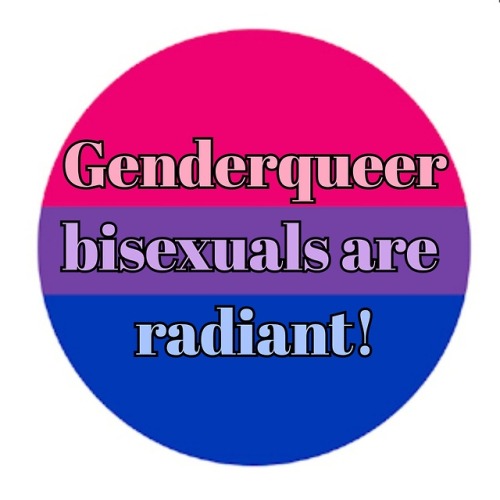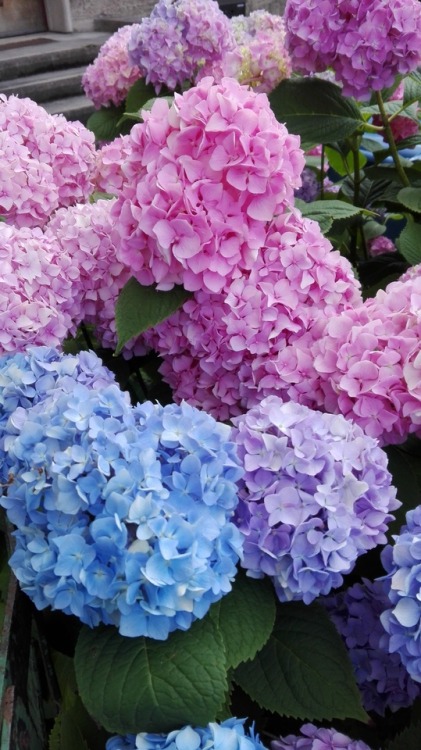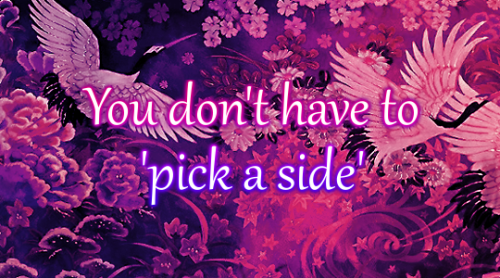#bisexual positivity
oh what id give to be in the arms of my girlfriend.
my girlfriend give me a hug challenge.
sometimes i sit back and question how i ended up with someone as beautiful as my girlfriend.
not to sound clingy but i really want a hug from my girlfriend right about now
my girlfriend fell asleep while we were facetiming and i was playing animal crossing, it was the cutest thing ever.
Photo from last summer. Inherited hydrangea and my only involvement here is cutting off the tops in late autumn. Magic
Post link
I used to be afraid of the word bisexual.
I used to let the potential judgement of others dictate my confidence and self-worth. It was mostly the prefix because I didn’t understand what it meant at the time. It felt like a reminder of the fetishization of bisexuality and it put a dirty taste in my mouth. I figured it was better off to stay out of conversations about bisexuality in some communities and to just say bi in others. Bi is fine, but better off for who? I’m not doing it for my own convenience. I’m doing it because I am afraid of others, and that small bit of power that they held over me pissed me off.
I began saying bisexual and bisexuality more often than bi, then I tried to find more reasons to say it. Now, seeing people say bisexual fills me with pride and joy. It is a pride in overcoming a fear and becoming stronger than hatred. It is a joy that I feel the need to pass on. I hope every bisexual person can feel this way about their bisexuality some day, regardless of how similar or different their journey is from mine.
Our bisexuality is an integral part of us that is deserving of our acknowledgment and respect. All of our attractions—same and other gender attractions—are valid and important. They make us who we are.
Your bisexuality is beautiful. Your bisexuality is true. Your bisexuality is wholesome or sensual or sexy or all or none of these. Your bisexuality is yours. Your bisexuality is enough.

To the autistic bisexuals reading this,
You are loved. You are worthy of respect. You are valued. You are deserving of all things good. Our community is glad to have you.
I hope you have a lovely day or evening.
Stop sexualizing bisexuality.
Bisexuality is not inherently sexual.
The fact that bisexual and other orientations end in “-sexual” does not mean they’re all about sex or sexual attraction. The suffixes refer to the sex(es) one has the capacity to experience attraction toward, not that the terms are exclusive to sexuality. Bisexuality always includes romantic attraction regardless of gender unless otherwise specified. Biromantic bisexuals aren’t the only bisexual people.
Aromantic bisexual people are bisexual.
Biromantic asexual people are bisexual.
People attracted to all genders are bisexual regardless of their sexual activity or desires. Romantic attraction is as important of a part of bisexuality as sexual attraction. Embrace bisexuality as a whole, not just the parts that are hot.

Happy International Asexuality/Aromanticism Day to bisexual aces and aros!
You are an important part of the AAC (asexual/aromantic coalition) and the LGBT community.
You are not any less bisexual for your asexuality or aromanticism, nor vice versa.
You are a complete human being who is worthy of love and respect.
And if you’re seeing this later than April 6, good day/evening in general, because these apply everyday.

I want a girlfriend. I want a butch girlfriend. I want a butch girlfriend that I can hold hands with at the farmer’s market as we plan a date in which we feed each other these strawberries dipped in chocolate. I want a butch girlfriend who will help me pick out another shade of red lipstick at the store because she knows she can kiss it off of me when we get home. I want a butch girlfriend who will slowly walk her fingers up under my skirt as I unbutton her shirt. I want a butch girlfriend who will tell me my hair looks beautiful while thinking about dragging me to our bed by it later that night. I want a butch girlfriend. I want a girlfriend.
Your partner’s attraction to all genders does not negate their love for you
Your partner’s love for you does not negate their attraction to all genders
Your attraction to all genders does not negate your love for your partner
Your love for your partner does not negate your attraction to all genders




Some of the alternative terms are gender neutral while others are specific to nonbinary people.
Remember: you should talk to your nonbinary friends to discuss what terms they are personally comfortable with. Don’t assume that enben will always use these terms.
“queer is a slur still used against many LGBT people” and “queer is an empowering identity to many LGBT people” are two statements that can and should coexist

You’re right, I am a confused bisexual.
I’m confused about how we’ve let our history get stolen, ignored, and redefined.
I’m confused about why our community has let others tell us who we’re supposed to be.
I’m confused about the way we’ve split and distanced ourselves from each other.
We’re all attracted to all genders. We’re all bisexual. Only we can define ourselves, if we so wish, and only we can make our history.
We’ve come so far from the days where the only options were gay or straight. We’ve come so far from the judgement and disbelief of both oppressive cishets and the gay community. We’ve come so far in advancing concepts of gender and trans inclusivity.
Now, there are too many labels encompassed by bisexuality to count. Now, others confining us to misconceptions is acceptable. Now, our trans-inclusive history is being twisted.
We need to remember who we are—bisexuals and biromantics. We need to remember why the LGBT community was formed—to fight lesbophobia, homophobia, biphobia, and transphobia and to achieve equality between all sexualities, romanticisms, and genders/gender statuses. We can’t do this if we’re separated and fighting.
Your bisexuality is not dirty or limited, so don’t you succumb to biphobic lies. Your bisexuality is lovely, it is honest, it is broad, it is inclusive, it is home, and it is what we make it together.

Uncomfortably Bisexual
In my experience, the best way to confront biphobia, including internalized biphobia, is by being as loudly bisexual as possible. I don’t think enough bisexuals realize how much pride affects how others treat us. The word “pride” is used a lot in LGBT vocabulary, but do we truly understand what it means to have pride?
Even just the word “bisexual” puts a dirty taste in some mouths. But only at first. You see, unfamiliarity is often the root of disgust, which is often the root of hatred.
I used to avoid using “bisexual” in favor of “bi” because something about it made me cringe. Saying it in public made me self-conscious of what others thought. I would anxiously shrink myself and say the word quietly to draw the least attention. I was thinking too much into it giving the biphobes what they wanted: fear. I shouldn’t have to falter at all about saying a word. More than a word, in fact.
An identity. A statement. A weapon.
For every biphobic comment I hear—regardless of from or to whom—I say the word to their face at least twice. I say it loudly. I articulate. I make sure that they hear it and that they get used to hearing it. I say it obnoxiously and uncomfortably often, because that’s the only way to make the word normal and comforting. Eventually, the word does not bring out such strong reactions or feelings from biphobes, or myself.

❝As bisexuals, we experience pressure from both sides to make up our minds, to make a final choice. If we don’t, we incur a collective contempt.
Bisexuals deal with homophobia, biphobia and even heterophobia. The desire to identify with a community often forces bisexuals to repress one side of themselves.
It is a key element in the overall strength and wisdom of the lesbian/gay community that it include and validate bisexual people, and the bisexual movement as an ally in fighting the common enemy, heterosexism.
It is clear that homophobia is at the root of biphobia. Bisexuals have no intention of undermining the gains made by lesbians and gay men in the struggle to be a free people. Coming out as a bisexual is not something that is done to acquire or flaunt heterosexual privilege.
I am bisexual because I am drawn to particular people regardless of gender. It doesn’t make me wishy-washy, confused, untrustworthy, or more sexually liberated. It makes me a bisexual.❞
— Lani Ka'ahumani. “The Bisexual Community: Are We Visible Yet?” Out & Outraged: Non-Violent Civil Disobedience at the U.S. Supreme Court, 13 Oct. 1987, pp. 47–48.






